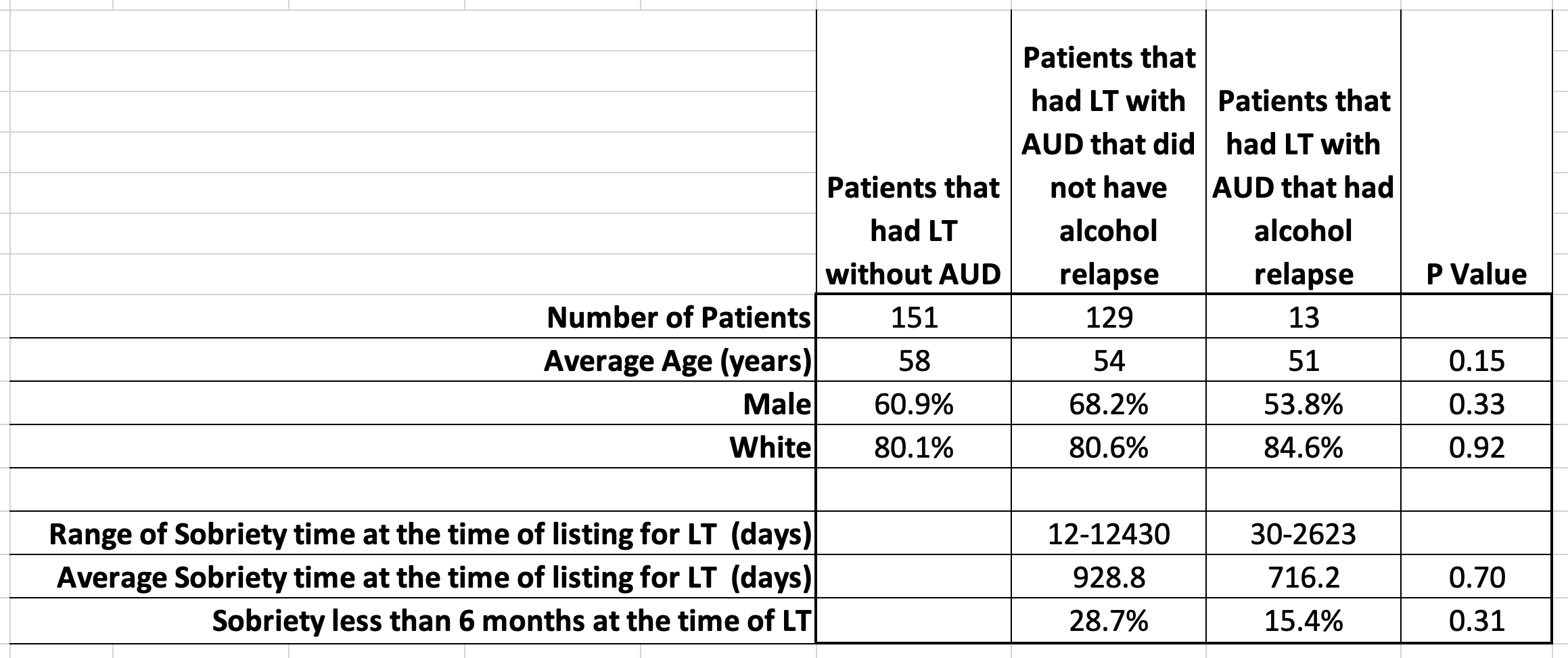Integrated Alcohol Use Disorder Clinic as a Strategy to Reduce Alcohol Relapse After Early Liver Transplantation in Patients with Alcohol Related Liver Disease
1Hepatology and Liver Transplantation, Tampa General Hospital, Tampa, FL, 2Tampa General Hospital, Tampa, FL
Meeting: 2022 American Transplant Congress
Abstract number: 420
Keywords: Alcohol, Liver cirrhosis, Liver transplantation, Mortality
Topic: Clinical Science » Liver » 55 - Liver: Recipient Selection
Session Information
Session Name: Recipient Selection
Session Type: Rapid Fire Oral Abstract
Date: Tuesday, June 7, 2022
Session Time: 3:30pm-5:00pm
 Presentation Time: 3:50pm-4:00pm
Presentation Time: 3:50pm-4:00pm
Location: Hynes Room 312
*Purpose: In recent years, for patients with Alcohol related Liver Disease (ALD), there has been a trend towards early Liver Transplantation (LT) rather than waiting a minimum of 6 months sobriety before LT. Since patients with ALD also have concomitant Alcohol Use Disorder (AUD) which is not cured with LT, we established an AUD clinic to reduce alcohol relapse (AR) post-LT at our program. Our primary aim was to measure AR rate and mortality in patients with AUD after early LT. Our secondary aim was to determine if pre-LT sobriety time was different in AUD patients who relapsed to alcohol post-LT versus those that did not.
*Methods: All adult patients with AUD who had LT between Jan 2019 and Dec 2020 at our program were included in the study. Patients identified to be high risk for AR were required to attend AUD clinic. All patients had post-LT follow-up until the end of study period (Jul 2021). AR was identified post-LT by patient and family report or by serum phosphatidylethanol (PEth). Pre-LT sobriety time between patients with post-LT AR and those without was compared using statistical tests.
*Results: 293 adults underwent LT between Jan 2019 and Dec 2020. 142 (48.5%) were identified to have AUD. 46 (32.4%) of these were followed in AUD clinic or seen by outside addiction specialist. 13 of 142 AUD patients (9.2%) had AR during the study period. 7 patients (4.9%) died post-LT during the study period. No deaths were related to AR. Average sobriety time at the time for listing for LT for patients with and without post-LT relapse was 716.2 days and 928.8 days respectively (P-value: 0.70). 15.4% of patients with post-LT AR and 28.7% without had less than 6 months pre-LT sobriety (P-value: 0.31).
*Conclusions: Our observed AR rate of 9.2% after early LT for patients with AUD is lower than that reported in the literature at other centers in the US and Europe (up to 29.2%) doing early LT. This is attributable to our program’s strategy to treat AUD through an integrated AUD clinic pre and post-LT. Our all-cause mortality rate of 4.9% is also similar or lower than most reported data from other LT centers. Lack of statistically significant difference of pre-LT sobriety time between patients with AR and without signifies the flaw of using 6 month sobriety as the sole predictor of AR. In conclusion, treating AUD after LT for ALD can significantly reduce risk of short term AR. Further studies are needed to confirm long term success of this strategy.
To cite this abstract in AMA style:
Syed RZ, Albers C, Kemmer N, Subramanian V, Machado-Denis C, Dhanireddy K. Integrated Alcohol Use Disorder Clinic as a Strategy to Reduce Alcohol Relapse After Early Liver Transplantation in Patients with Alcohol Related Liver Disease [abstract]. Am J Transplant. 2022; 22 (suppl 3). https://atcmeetingabstracts.com/abstract/integrated-alcohol-use-disorder-clinic-as-a-strategy-to-reduce-alcohol-relapse-after-early-liver-transplantation-in-patients-with-alcohol-related-liver-disease/. Accessed February 16, 2026.« Back to 2022 American Transplant Congress

